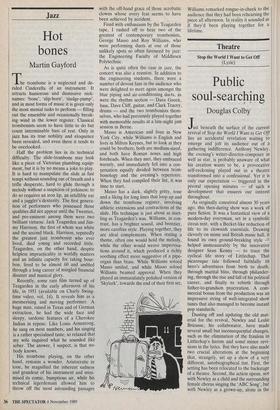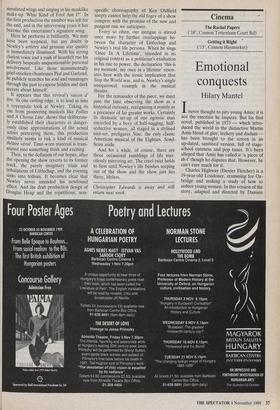Theatre
Stop the World I Want to Get Off (Lyric)
Public soul-searching
Douglas Colby
Just beneath the surface of the current revival of Stop the World I Want to Get Off lies an accidental revelation waiting to emerge and jolt its audience out of a gathering indifference. Anthony Newley, the evening's writer-director-Composer as well as star, is probably unaware of what his creation wants to be, a provocative self-reckoning played out in a theatre transformed into a confessional. Yet it is only our expectation — triggered in the pivotal opening minutes — of such a development that ensures our interest throughout.
As originally conceived almost 30 years ago, this then-daring show was a work of pure fiction. It was a fantastical view of a modern-day everyman, set in a symbolic circus tent, with a Becket-like reduction of life to its clownish essentials. Drawing cleverly on mime and British music hall, it found its own ground-breaking style -= helped immeasurably by the innovative designer Sean Kenny — to trace the cyclical life story of Littlechap. That picaresque tale followed faithfully its hero's adventures from birth to death, through marital bliss, through philander- ing, through the rise and fall of his political career, and finally to rebirth through father-to-grandson procreation. A com- mercial bonus from the production was an impressive string of well-integrated show tunes that also managed to become instant pop standards.
Dusting off and updating the old mat- erial for the revival, Newley and Leslie Bricusse, his collaborator, have made several small but inconsequential changes, such as the elimination of the fraulein in Littlechap's harem and some minor revi- sions in the lyrics. But they have also made two crucial alterations at the beginning that, strangely, set up a show of a very different, autobiographical tint. First, the setting has been relocated to the backstage of a theatre. Second, the action opens, not with Newley as a child and the surrounding female chorus singing the 'ABC Song', but with Newley as a grown-up, alone in the simulated wings and singing in his masklike make-up 'What Kind of Fool Am I?'. In the first production the number was left for the end, and in the intervening years it has become this entertainer's signature song.
Here he performs it brilliantly. We may have been sceptical, but any doubt in Newley's artistry and genuine star quality is immediately dismissed. With his strong clarion voice and a rush of heartfelt rue his delivery bespeaks unquestionable personal involvement. Like those monumentally grief-stricken chanteuses Piaf and Garland, he publicly searches his soul and rummages through the past to expose hidden and dark secrets about himself.
It appears that this revival's raison d' etre, its one cutting edge, is to lead us into a voyeuristic look at Newley. Taking its cue from pioneering musicals like Follies and A Chorus Line, shows that deliberate- ly established their characters as danger- ously close approximations of the actual actors portraying them, this production similarly seems to risk a kind of musical theatre verite. Time-worn material is trans- muted into something fresh and exciting.
Then, to the deflation of our hopes, after the opening the show reverts to its former track, the purely imaginary trials and tribulations of Littlechap, and the evening sinks into tedium. It becomes clear that Newley never intended his newfound effect. And the drab production design of Douglas Heap and the repetitious, non- specific choreography of Ken Oldfield simply cannot help the old fogey of a show compete with the promise of the new and pungent one we anticipate.
Every so often, our intrigue is stirred once more by further overlappings be- tween the character of Littlechap and Newley's real life persona. When he sings `Once In A Lifetime', intended in its original context as a politician's exultation in his rise to power, the declaration 'this is my moment, my once in a lifetime' reson- ates here with the ironic implication that Stop the World was, and is, Newley's single unequivocal triumph in the musical theatre.
For the remainder of the piece, we must pass the time observing the show as a historical curiosity, recognising it mainly as a precursor of far greater works. Certainly its dramatic set-up of one egoistic man encircled by a bevy of half-nagging, half- seductive women, all staged in a stylised unit-set, prefigures Nine, the only classic American musical of the Eighties, Sond- heim aside.
And for a while, of course, there are those occasional rumblings of life mer- cilessly mirroring art. The cruel twist holds us firm until Newley's life finishes seeping out of the show and the show just lies there, lifeless.

















































 Previous page
Previous page